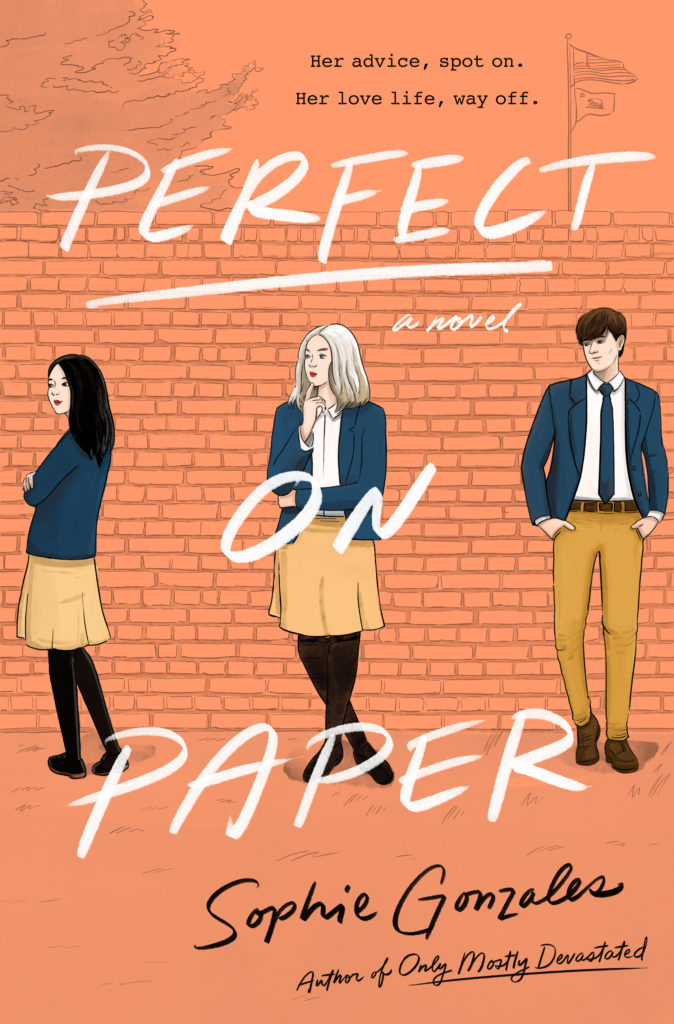Anagha Gopal
The only thing universally agreed on is this: if you’re having relationship issues and you slide a letter through the vents of locker eighty-nine, you will receive an email from an anonymous sender within the week, giving you advice. And if you’re wise enough to follow that advice, your relationship problems will be solved, guaranteed, or your money back.
And I rarely have to give people their money back.
Gonzales 1
Darcy Phillips has been the resident anonymous romantic advisor at her school since ninth grade, secretly running her advice business from an abandoned locker. Things are going well – business is booming, and to top that, there’s a chance that Darcy’s best friend Brooke Nguyen might someday reciprocate Darcy’s romantic feelings for her. But then Darcy’s caught taking out letters from locker eighty-nine by Alexander Brougham. Darcy cannot have her secret exposed, especially because a misguided action of hers would come to light, possibly destroying her friendship with Brooke. Desperate to keep her anonymity intact, Darcy decides to take up Brougham’s offer. After all, helping him win over his ex-girlfriend as a relationship coach in real-time won’t be too difficult, right?
In Perfect on Paper, Sophie Gonzales offers a nuanced and sensitive portrayal of a bisexual teen figuring out romance and friendship for herself, even as she works towards giving the ‘perfect’ advice to everyone else. The book’s advice-giving premise reminded me of the Netflix series Sex Education (2019) and film The Half of It (2020). Gonzales herself notes this similarity in an interview with The Nerd Daily. Like these media texts, Gonzales’ book employs the setting of a high school and explores, amongst other things, the issue of a teenager having vested interests while giving relationship advice. The advice-giving premise draws attention to the informal networks that teens may form to help each other navigate interpersonal relationships, pointing to the lack of spaces which allow for open discussions in their schools. At the same time, texts with this premise also show their protagonists reflecting on ethics. What qualifies them to give relationship advice? What are the boundaries between giving advice and interference? How does accountability work in an informal set up? The last question is particularly important for Darcy, as – unlike the protagonists of Sex Education and The Half of It – she usually remains anonymous to those who seek her advice.
I found it difficult to believe that Brougham was the first person to breach Darcy’s anonymity. While the book qualifies that Darcy is cautious and visits locker eighty-nine only after school hours, it seems unlikely that other curious students wouldn’t surreptitiously hang back to see who runs the locker, given its popularity. I would have liked to see Darcy handle a few close calls over the course of the plot. Overall, however, Gonzales portrays Darcy’s advice business with careful balance. Darcy is surefooted and insightful in the advice she dispenses through emails, but is often at a loss when it comes to her own romantic life. This balance is maintained by showing readers that Darcy arrives at the advice she gives after sustained research. On the other hand, she is often carried away by her feelings and quick to react when it comes to Brooke. This contrast makes Darcy realistic and endearing, and adds humour to the book.
The letters that Darcy receives also add to the book’s realistic detail. These letters prompted me to think about the narrative arcs usually found in the romance genre. The letters do not focus on dramatic misunderstandings or grand romantic gestures. Instead, they allude to issues involving conflicting communication styles, confusing social media behaviour, or the difficulty of approaching someone to make a connection. In effect, these letters draw attention to the everyday awkwardnesses that inform romance, which may be difficult for their writers to express in regular conversations, without the cover of anonymity. The book emphasizes on the importance of interpersonal relationships which hold space for the kind of vulnerability that the letters received by Darcy allow. This is visible through Darcy’s conversations with Brougham. Their romance arc is punctuated by a growing mutual understanding, and their palpable ease in each other’s company. When Brougham expresses emotions which he would usually hide, Darcy is able to help him in a more informed way. Similarly, it is when Darcy stops being defensive that she begins to reflect on his critique of some of her methods.
The success of Darcy’s business despite its shortcomings points, in part, to a dearth of spaces for discussing sensitive issues. However, such spaces are not entirely absent in the book. The Queer & Questioning Club at Darcy’s school, for instance, is presented as a deeply impactful space. Founded and run by students, the club has an equitable structure where each member cyclically gets to host a meeting. While a teacher is present at the meetings, he suggests that the members “could view him as more of a queer mentor than a teacher” during the meetings (Gonzales 32). This allows the members to confidentially share any complaints that they might have about other teachers or staff members. In the actively inclusive and non-judgemental space created by the club, Darcy is able to discuss the biphobia that she has encountered, particularly in the form of bi-erasure. Over the course of a meeting, Darcy finds both words and support to articulate the self-doubt that she’s been experiencing.
“Internalized biphobia?” repeated Jason.
Ray didn’t skip a beat. “Yeah. It’s when bisexuals start to believe the biphobia they’re surrounded by. We’re told that our sexuality isn’t real, or that we’re straight if we’re with another gender, and that our feelings don’t count if we’ve never dated a certain gender, that kind of crap. Then we hear it so many times we doubt ourselves.”
“Yeah,” I said. “That’s how I feel…”
Gonzales 295
Gonzales provides a helpful resource by describing both the structure and the content of the meetings in detail. She also ensures that the members of the club have nuanced relationships with each other. Whether they are each other’s friends, acquaintances, or competitors, the club provides a space where they come together once a week to listen to and support each other.
Perfect on Paper presents a world where mistakes are not unforgivable, but accountability is essential. Darcy comes across as a well-rounded character not only because she makes mistakes, but also because these mistakes are not easily absolved by the narrative. Instead, the book remains committed to generating self-reflexivity. Darcy realizes how, when it comes to her friendship with Brooke, she may have acted in her own interests under the guise of being protective. Her thoughtfulness extends to her advice business, as she considers the power she holds as an advice-giver. I would have liked to see the effect of Darcy’s growing self-reflexivity on her advice emails, perhaps in the form of an epilogue. While the book showed her turning a critical eye on the advice she gave in the past, I found myself wondering how her tone and responses would change in the future.
Overall, I enjoyed reading Perfect on Paper and found it to be both insightful and entertaining. I would especially recommend the book to readers who wish to reflect on romance narratives or romance as it pertains to their lives.
References
Gonzales, Sophie. Perfect on Paper. Kindle ed., Hodder Children’s Books, 2021.
Koehler, Mimi. “Q&A: Sophie Gonzales, Author of ‘Perfect On Paper’”. The Nerd Daily, March 2021, https://thenerddaily.com/sophie-gonzales-perfect-on-paper-interview/. Accessed 8 June 2021.
Sex Education. Created by Laurie Nunn, 2019, Netflix, https://www.netflix.com/title/80197526
The Half of It. Directed by Alice Wu, 2020, Netflix, https://www.netflix.com/title/81005150

Perfect on Paper (Sophie Gonzales)
Hodder Children’s Books
ISBN (Paperback): 9781444959277
343 pages
Publication date: 11 March 2021
